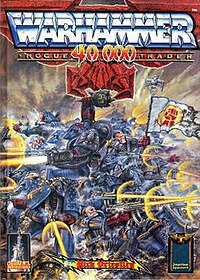Warhammer 40,000: Rogue Trader
| Rogue Trader | |
|---|---|

Rogue Trader - the first edition of Warhammer 40,000
|
|
| Designer(s) | Rick Priestley Andy Chambers and others |
| Publisher(s) | Games Workshop |
| Years active | 1987-1993 |
| Random chance | Dice rolling |
| Skill(s) required | Strategy, Arithmetic |
Warhammer 40,000: Rogue Trader is the first edition rule/source book for the Warhammer 40,000 miniature wargame by Games Workshop. The subtitle refers to a particular class of character within the Warhammer 40,000 universe.
The existence of a science fiction table top game in development by Games Workshop was made known through Citadel Journal in 1986 and Rogue Trader was officially released at Games Workshop's annual Games Day event in October 1987. Created by Rick Priestly, The game was sub-titled Warhammer 40,000 in order to clearly differentiate it from 2000 AD's Rogue Trooper comic series. The game featured rules that were closely modelled on those of its older fantasy counterpart, Warhammer Fantasy Battle. The majority of the book was written by Rick Priestley who was also responsible for WFB.
The gameplay of Warhammer 40,000: Rogue Trader differs from its main modern-day descendant (Warhammer 40,000), in that it was heavily role-play-oriented, with great detail placed on weaponry and vehicles and the inclusion of a third player (the Game Master) in battles, a role not too different from the Dungeon Master of Dungeons and Dragons. Rogue Trader game introduced some races that were later removed from the Warhammer 40,000 setting, such as Squats (Warhammer dwarfs in space), Zoats (also present in Warhammer Fantasy Battle) and the Space Slann (a humanoid frog-like race).
Models which were released for Rogue Trader are no longer produced and are available in private collections with limited remaining stocks available on the Games Workshop online store.
Like many later incarnations the Rogue Trader rulebook mostly contained what is often termed 'fluff' (more properly referred to as 'Lore'), i.e. the historical background of the Imperium and alien races. Information on the Warp was limited and the forces of Chaos were nowhere to be seen; but they were referred to by game designer Rick Priestly in the pre-release announcement, and they did show up shortly after in expansion rule books which provided not just greater background for the various races and armies but also the first proper army lists. Only a small portion of the book contained rules, with a large number of pages devoted the background of the universe. The fact that the current edition still contains a great amount of 'fluff' is a testament to the popularity of this arrangement.
...
Wikipedia
